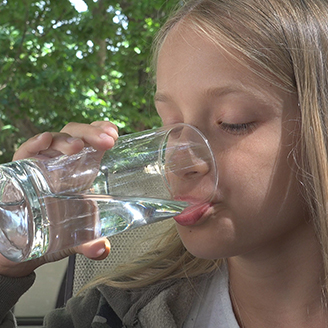Hard Water
The most common problem found in water may be hardness, generally associated with an abundance of calcium and/or magnesium dissolved in the water. Hard water has not been shown to cause health problems, but can be a nuisance as it may cause soap curds and deposits to form on pipes and other plumbing fixtures. Over time this can reduce the diameter of the pipes.
Scale deposits are a typical indicator of hard water.
Hard water is high in dissolved minerals, both calcium and magnesium. You may have felt the effects of hard water the last time you washed your hands. Depending on the hardness of your water, after using soap to wash you may have felt there was a film of residue left on your hands. In hard water, soap reacts with the calcium (which is relatively high in hard water) to form “soap scum”. When using hard water, more soap or detergent is needed to get things like your hands, hair and laundry clean.

Have you done a load of dishes in the dishwasher, taken out the glasses, and noticed spots or film on them? This is more hard-water residue—not dangerous, but unsightly. When hard water is heated, such as in a home water heater, solid deposits of calcium carbonate can form. This scale can reduce the life of equipment, raise the costs of heating the water, lower the efficiency of electric water heaters, and clog pipes. And, yes, mineral buildup will occur in your home coffee maker too, which is why some people occasionally run vinegar (an acid) through the pot.
Water treatment can improve hard water issues.
Scale deposits from hardness buildup affects fixtures and appliances found throughout the entire home or business. For this reason, hardness is typically addressed with treatment of water for the whole house or building rather than just at a specific faucet.


